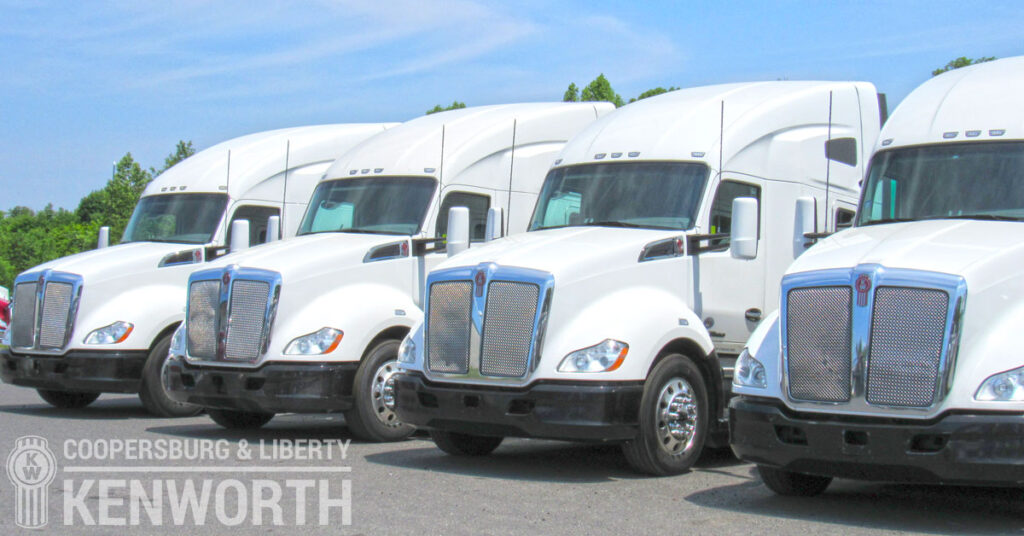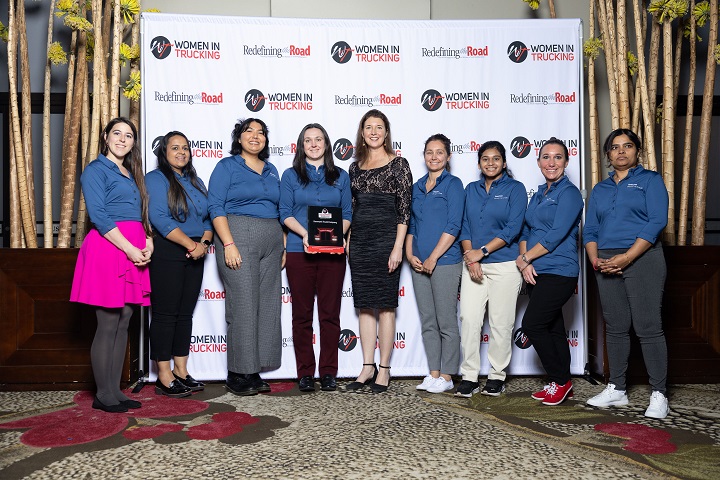Truck Financing Advice for First-Time Buyers

Buying your first truck is an exciting step toward building your career, but navigating the financing process can feel overwhelming. From understanding loan requirements to finding the right truck to finance, there’s a lot to consider before you even get behind the wheel of your Kenworth. In this guide for first-time buyers, we’ll break down determining your budget, researching truck models, and making the purchase.
Potential Challenges
Once you’ve gotten your Commercial Driver’s License, it’s time to begin thinking about getting your first truck. But there are some obstacles that you may encounter during the loan application process.
Limited Credit History: First-time buyers may have little to no credit history, especially if they’re young or just starting out in the business. A limited credit history can make it challenging to demonstrate creditworthiness to lenders.
Higher Interest Rates: Due to the perceived higher risks associated with first-time buyers, lenders may offer loans with higher interest rates. But don’t be deterred, this will help in building creditworthiness and payment consistency.
Down Payment Requirements: Lenders may require a substantial down payment which can be a significant financial burden for first time buyers.
Don’t worry though! The information below will help guide you through the process of buying your first semi-truck. Staying prepared and informed can increase your chances of getting the loan you need for your dream truck.
Determine Your Budget
For first-time commercial truck buyers, it is important to set a strict budget. Before shopping, outline how much you can afford to spend upfront as well as on monthly expenses like fuel, loan payments, insurance, and maintenance. It’s also imperative to make sure you have additional funds for any unexpected costs that may come up. Setting a budget that covers all aspects, while allowing for extra funds, is important to maintaining the growth of your business.
Research Different Models
There are so many different types, makes, and models of trucks out there that it can be overwhelming when first researching the type of truck you need.
The Sales staff at our Coopersburg & Liberty Kenworth dealerships can help you with your search! With hundreds of new and used trucks in stock, there most certainly is a truck for every driver. We have the inventory to get you on the road. Our brands include Kenworth, Peterbilt, Mack, Freightliner, Western Star, and more. We have a vast variety of years, models, and truck types to choose from. Whatever your budget may be, there is a truck to fit it.
Financing Requirements
Applying for a commercial vehicle loan is similar to applying for any other type of loan. The buyer needs to provide personal and financial information to the dealership and their lender. The credit application process includes a review of credit history, income, and employment among other details. The type of truck you choose plays a major role in this decision. Additionally, meeting the credit score requirements, and having a sufficient down payment are important for qualifying for a commercial truck loan as a first-time buyer. By understanding these requirements and prepping the necessary documents, you will be one step closer towards owning your truck.
For more on the loan application, read our Semi-Truck Financing Requirements.
Financing Terms
Interest rates and loan repayment terms vary based on multiple factors such as a buyer’s credit score, financial history, choice of truck, and more.
Interest rates play a significant role in the overall cost of the loan. A lower interest rate can result in substantial savings over the course of the loan’s term. Loan term durations vary and are determined based on each individual buyer’s unique needs and financial status. Shorter terms may lead to higher monthly payments but result in low cumulative interest costs. Choosing the truck for your business after determining your budget plays a role in your potential interest rates and repayment terms. Make smart decisions for you, your business, and your financial future.
Seeking Financial Advice
Our Finance Manager is always here to answer any question no matter what step of the financing process you are in. Advice is always beneficial, especially for first-time buyers. He can provide valuable insights and guidance on your process to becoming a truck owner. And, by filling out our Financing Application, we can further tailor your available options and evaluate your financial readiness.
Buy from a Trusted Dealer
Partnering with a reputable dealer, like Coopersburg & Liberty Kenworth, will help simplify your financing process. Our experienced sales team will guide first-time buyers through the process of purchasing and financing. Contact us to discover your options!
Sign Up for Exclusive Blog Content
"*" indicates required fields
Benefits of Buying Used Kenworth Trucks

Investing in a commercial truck is a major decision, and Kenworth is a top choice for performance, durability, and reliability. While new Kenworth models can be a more popular choice, purchasing a pre-owned truck offers a great range of benefits. For owner-operators, fleet managers, or first-time buyers, a used truck delivers the same quality at a more affordable price.
In this blog, we’ll explore the advantages of buying used trucks from cost savings and reliability to flexible financing options, and why it may be the perfect option for your trucking needs.
Lower Initial Cost
Used trucks are typically less expensive than newer models, making them a budget-friendly option without compromising quality. With a pre-owned truck, like a Kenworth, you can experience performance for a fraction of the price. For first time owner-operators, this affordability can allow you to more easily enter the industry while leaving room in your budget for other business expenses.
Our dealerships offer financing options tailored to your unique financial situation. This will make it easier to manage your budget while investing in a reliable vehicle. Depending on factors such as the truck model, year, condition, and your financial standing, you may also benefit from a lower down payment.
Lower Financial Risk
Used trucks come with a lower price tag than newer models which reduce your financial risk from the start. If at any point you need to sell your used truck, the potential loss on your investment will be smaller compared to selling a brand new truck, which begins to depreciate the moment it leaves the lot.
Lower Depreciation
New trucks depreciate quickly, whereas used trucks depreciate at a much slower rate. This means that if you choose to sell or trade in your truck down the line, it’s likely to retain more of its value compared to a newly purchased model. For first-time owner-operators, the slower depreciation allows you the option to potentially sell the truck later with minimal value loss – especially if the truck has been well-maintained.
Wide Selection
Our used inventory features a wide selection of makes, models, and years, providing you with more options than the new truck market. Whether you’re searching for a specific model year, a customized configuration, or a particular set of features, used trucks often provide more flexibility. This allows you to find the perfect vehicle for your needs without the added expense of paying additional for each of the latest features in a brand new model.
“Free” Customization
Many used trucks come equipped with aftermarket modifications and customization added by previous owners. These can include upgraded tires, performance enhancements, and more. Purchasing a pre-owned truck with these already installed features can save you both time and money, allowing you to enjoy your personalized vehicle without the additional costs of making these upgrades yourself.
At Coopersburg & Liberty Kenworth, our body shop is equipped to help you customize any truck from our dealership’s inventory to meet your exact specifications.
Proven Reliability
Used commercial trucks offer another advantage: they’ve already proven their reliability and performance on the road. Known for their durability, Kenworth trucks are built to go the distance – literally! Used Kenworth trucks often exceed hundreds of thousands of miles. They are designed to handle demanding workloads and deliver longevity when well-maintained. Even as pre-owned models, they uphold their reputation for dependability. With regular maintenance, a used Kenworth can provide years of reliable service, making it a smart investment for any driver and their business.
Quicker Availability
When you have a large quantity of used truck inventory, they are available for immediate purchase. This makes for an excellent option if you need to expand your fleet or replace your worn-out vehicle quickly. At Coopersburg & Liberty Kenworth, we offer an extensive inventory of used truck. Whether you’re looking for a specific truck type or need a reliable option to meet your business demands, we have a truck for every driver’s needs. Our sales team is always available to help you find the perfect truck. With immediate availability, you can get back on the road as quickly as possible!
Used Trucks at Coopersburg & Liberty Kenworth
Our Coopersburg & Liberty Kenworth dealerships in New Jersey and Pennsylvania offer a vast selection of used trucks at competitive prices. Purchasing a used commercial truck can significantly reduce your overall costs while boosting your profitability. Used trucks are an ideal choice, especially for those first time buyers. Contact our team today to explore our extensive inventory and learn more about your personal options!
Sign Up for Exclusive Blog Content
"*" indicates required fields
How to Become a Truck Driver: Getting Your CDL

How do I get a Commercial Driver’s License? We’ve got the answer! This is your ultimate guide to start your truck driving career: how to get your CDL, what requirements are needed, and the steps toward getting on the road.
How do I become a commercial truck driver?
In order to start driving medium- and heavy-duty trucks, you must first earn your commercial driver’s license, or CDL. There are a handful of questions that come with obtaining it. What is a CDL? What are the classification types? How long is the process? What is the age requirement? How much does a CDL license cost?
If you are considering a profession in trucking, we’ll begin with the basics…
What is a commercial truck driver?
Let’s start with something simple. What is a commercial truck driver?
A commercial truck driver operates a large vehicle, such as a tractor-trailer or delivery truck, to transport goods and materials to and from retail and distribution centers or manufacturers. They play a key role in the supply chain by delivering products like retail merchandise, food, automobiles, or hazardous materials across local, regional, or national routes. Commercial truck drivers are responsible for ensuring safe and timely deliveries, adhering to road and traffic laws on driving and rest periods.
As a truck driver, you will need to take care of your truck by performing pre-trip inspections, regular maintenance, and ensuring you retrieve and deliver the correct products to the right location.
What is a CDL?
A Commercial Driver’s License (CDL) is a specific credential that allows you to drive a commercial vehicle on the road. It requires extensive knowledge and special skills to safely operate heavy, large, and/or specialized vehicles.
First and foremost, you will want to get a copy of your state’s Commercial Driver’s License (CDL) Manual. These manuals are available at any state field location and can also be downloaded from their official website and printed. Each state has their own processes to acquire a CDL.
No matter what type of truck driving you are looking to get into, it is required that you have a CDL in order to operate any type of commercial motor vehicle.
What are the CDL Classification types?
You’ll want to choose the vehicle and what kind of driving you want the license for. There are 3 different types of CDL classifications: A, B, and C.
Class A CDL
“Required to operate any combination of vehicles with a gross combination weight rating (GVWR) of 26,001 or more pounds, provided the towed vehicle is heavier than 10,000 pounds.” (Source)
Vehicles permitted with a Class A CDL include Tractor-Trailers (Semi-Trucks or 18-Wheelers), Tanker Vehicles, Flatbeds, and Livestock Carriers. This license also allows you to drive vehicles covered under classes B and C.
Class B CDL
“Required to operate any single vehicle that isn’t hitched to a trailer (commercial trucks that have an attached cab and cargo area with a combined weight greater than 26,000 pounds, as well as trucks with a detached towed cargo vehicle that weighs less than 10,000 pounds).” (Source)
Vehicles permitted with a Class B CDL include Straight Trucks (Large, Single-Unit Vehicles), Large Buses (School and/or City Buses), Box Trucks (like delivery trucks), Dump Trucks, as well as Recycling and Garbage Trucks.
Class C CDL
“Required to operate a single vehicle with GVWR of less than 26,001 pounds or a vehicle towing another vehicle that weighs less than 10,000 pounds, or transports 16 or more passengers, including the driver.” (Source)
Vehicles permitted with a Class C CDL include transport vehicles such as Small Passenger Vans and Busses, and additionally include small HAZMAT trucks.
Endorsements
Drivers who are looking to drive trucks can add an endorsement to their CDL license. Earning an additional endorsement allows drivers to operate different kinds of vehicles and haul specific types of freight based on what class of CDL they have. The six types of endorsements include:
- “N” Tank Vehicle/Tanker
- “H” Hazardous Materials
- “X” Tanker/HazMat Combination
- “T” Doubles/Triples
- “P” Passenger Transport
- “S” School Bus
What is the age requirement to drive a commercial vehicle?
A driver must be at least 18 years old to drive a commercial vehicle within their state; 21 years of age to drive across state lines. Drivers must have an existing valid, non-commercial driver’s license to obtain their CDL. They must also have two years of driving experience under their belt before even beginning the process of getting their CDL. A clean driving record is essential. Serious traffic violations, criminal records, or a history of DUIs/DWIs may disqualify you. Applicants must be able to pass a background test, provide proof of citizenship, and pass standard physical and medical examinations.
How much does getting a CDL cost?
The total cost of a Commercial Driver’s License depends on multiple factors: home state, classification type, and training program. “On average, the CDL license cost ranges from $1,500 to $8,000, covering training fees, written and skills test fees, and licensing fees. Additional costs include medical exams and specific vehicle endorsements.” (Source)
How long does training take to get a CDL License?
It can take weeks to months to train to get your Commercial Driver’s License. Depending on several factors, such as the type of CDL you’re pursuing, the state you’re living in, the training program you choose, and how quickly you can pass the required tests. In short, the entire process can take anywhere from 4 to 12 weeks. This includes training, the Commercial Learner’s Permit and CDL written and road tests, as well as obtaining insurance and your official, physical CDL license.
It is important to enroll in a truck driving program in your area. You’ll not only learn the laws and regulations necessary for truck driving, you’ll also get hands-on experience driving a commercial vehicle with guided instruction.
The CDL Training Program can take 3 weeks to 3 months to complete. Full-Time training programs take 3 to 6 weeks to complete. This includes a combination of in-class instruction and behind-the-wheel training. Part-Time training can take longer, about 2 to 3 months, depending on your schedule and availability. Company-Sponsored training depends on how long your trucking company offers. These programs can be fast-tracked with the expectation that you’ll work for the company after getting your license.
If you need additional endorsements (pertaining to driving a specialized vehicle) or state-specific requirements (such as different waiting periods or additional requirements), the process may take longer.
What is the Commercial Learner’s Permit Exam?
To get your CDL, you first must get your Commercial Learner’s Permit (CLP). This permit is issued by your state and authorizes you to practice driving on-road in the vehicle. The written test covers topics like general driving rules, road safety, vehicle operation, and laws specific to commercial driving. Passing the CLP exam allows a driver to practice driving under the supervision of a licensed CDL holder, which is necessary before taking the CDL skills test and earning your full license.
Once you’ve passed your CLP, you must have had it for 14 days prior to applying and testing for your CDL.
How to Get a CDL
When you’re prepared and ready to take your CDL test, this is what you’ll do:
You will take the FMCSA Exam. This test includes both written and physical tests. The written exam tests your knowledge on federal law, while the physical portion tests your vision and driving capabilities. Keep in mind that you will not need to retake the written portion once you’ve passed, but you will need to retake the physical part of the exam every two years.
According to the Federal Motor Carrier Safety Administration, “You must pass all 3 parts of the Skills Test: the Vehicle Inspection Test, the Basic Controls Test, and the Road Test. Your state may even allow you to use their “training aid” to help you remember items on the vehicle inspection checklist.” (Source)
Skills Test
The Pre-Trip Vehicle Inspection Test is a thorough examination of the vehicle. This includes checking the engine compartments, brakes, lights, tires, and other essential components of a truck. While inspecting, you must explain what each part is and why it’s important. You are expected to demonstrate your knowledge of the vehicle, its condition, and its safety requirements.
The Basic Vehicle Controls Test involves reversing, parking, and turning. These exercises are meant to demonstrate how you maneuver and perform these actions.
During the On-Road Driving Test, you must demonstrate multiple operations: the ability to start and stop the vehicle smoothly and safely. Merging and changing lanes using signals and checking mirrors. Yielding appropriately and crossing at intersections and railroad tracks. The ability to start and stop on an incline, as well as managing the vehicle’s weight without rolling backward. Making safe and controlled turns and maneuvering curves. The ability to navigate various traffic conditions, such as urban, suburban, and highways. Lastly, how the driver handles simulated emergency situations, such as sudden stops or obstacles.
Once you’ve passed the written and road tests, and pay the fees associated, you’ll have received your CDL!
Getting a Commercial Driver’s License in Pennsylvania
Getting your Commercial Driver License in New Jersey
Get a Commercial Driver License in New York
Getting your Commercial Driver’s License in Delaware
Sign Up for Exclusive Blog Content
"*" indicates required fields
Women in Trucking: Kenworth is a “Top Company for Woman to Work for”

On November 11, Kenworth was named a “Top Company for Women to Work for in Transportation” by the Women in Trucking Association at the 2024 Accelerate! Conference & Expo. This marks the seventh year in a row that Kenworth has been honored for its commitment to creating an inclusive workplace.
Kenworth shares several key characteristics with other honorees including — gender diversity, competitive compensation and benefits, professional development, and career advancement opportunities. Several Kenworth employees attended the Conference & Expo to participate in educational sessions and networking opportunities.
Kenworth director of marketing, Kyle Kimball, said, “It’s important to Kenworth to foster an inclusive environment that provides our employees with the support, resources, and benefits essential for their career advancement. Kenworth offers excellent career opportunities for women, and we are proud to once again receive recognition from WIT, an organization that does great work in promoting our industry.” (Source)
Women in Trucking
The Women in Trucking (WIT) Association is a non-profit organization which encourages “the employment of women in the trucking industry, promote their accomplishments and minimize obstacles faced by women in the trucking world.” (Source)
Kenworth supports women through various female-focused industry organizations, such as WIT and the Society of Women Engineers (SWE). The SWE is works to develop, advance, and support women in engineering careers and leadership roles. By partnering with Kenworth, the organization offers networking opportunity events, volunteer initiatives, as well as training and mentorship programs.
Kenworth Supports Women in Trucking
The ongoing commitment to diversity and inclusion sets Kenworth apart in the transportation industry. By supporting organizations like WIT and SWE, Kenworth creates an environment where women can advance in their careers and drive industry growth. This recognition reflects the company’s dedication to building a workplace that values equality, opportunity, and empowerment for all employees. As Kenworth moves ahead, it will continue to promote diversity and pave the way for women in trucking.
If you are a woman in trucking, Apply Here! If you’re looking for a career in a family and team-oriented environment, Coopersburg & Liberty Kenworth is the place for you. To discover more about our team, benefits, and open positions, visit our Careers page.
Sign Up for Exclusive Blog Content
"*" indicates required fields
